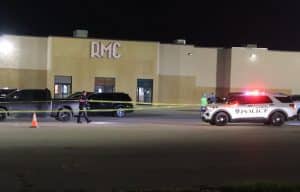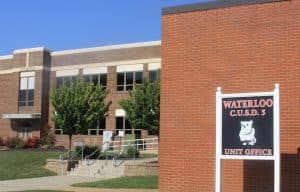Solar grounded in Columbia

Members of Christ Community Church in Columbia found out the hard way that you can’t fight City Hall.
Despite all accounts of church leaders performing their due diligence and trying to appease neighbors and city officials, aldermen during Monday’s meeting of the Columbia City Council voted unanimously against issuing a special use permit for a ground-mounted solar array on Christ Community Church grounds.
Following two August council meetings – each featuring about an hour of public comment for and against the solar array – aldermen voted to refer the matter back to the Columbia Plan Commission to allow members of the church’s solar committee the opportunity to tweak the proposal to address concerns of the commission and neighboring property owners.
The special use permit received a unanimous vote July 14 to not recommend approval despite a commission report acknowledging the proposal “met or exceeded all city code requirements.”
During its Sept. 8 meeting, the Plan Commission voted 3-3 on the matter, which amounted to a failure of the proposal to gain recommended approval.
During that meeting, the church submitted a report to the commission addressing “a lack of justification” as a reason for denial July 14.
The church’s report listed several reasons why it favored a ground-mounted array, chiefly that roof-mounted panels would produce 42 percent less energy than the ground-mounted set up due to the physical alignment of the church building to the path of the sun, according to St. Louis based solar installation company Azimuth Energy.
To assuage concerns about the “view of the array” – visible by “about five of the 25 residential neighbors” – church leaders engaged in an “open dialogue” which included the church hosting two open house forums and sending certified letters and emails explaining the church’s position and possible remedies to alleviate those residents’ concerns.
Finally, the report contained a U.S. Environmental Protection Agency study that found “there is no difference between the risk between a roof-mount and a ground-mount system” in terms of potential pollution caused by heavy metals used for solar power production.
The same arguments, along with concessions offered by the church, were heard Monday night during a relatively short public comment session lasting just under 30 minutes.
Christ Community Pastor Jared Parker was the first to speak.
“When we began exploring solar, we thought it was pretty simple – take advantage of the incentives available to get clean energy, be better stewards of God’s creation, save money and free up resources to do a little more good in the world.” Parker said. “We did not intend to upset our neighbors. Honestly, we did not realize that this project was going to cause such a concern.”
One neighboring property owner commented that the most recent city comprehensive plan suggests solar arrays are not appropriate for residential neighborhoods, adding that property values are negatively impacted when in proximity to “industrial” scale solar arrays.
Parker responded by explaining the church is on a parcel zoned for A-1 agricultural use, adding the proposed solar project would only cover 1 percent of the nearly 25-acre property, objecting to the Plan Commission’s description of the project as introducing a “semi-industrial appearance.”
Parker later explained placing a ground-mounted system elsewhere on the property would also decrease electricity production in addition to potentially obstructing the play area of the church’s preschool students or eliminating field space at the Oerter Park soccer park, which is also part of the Christ Community property.
Christ Community Church member and current Waterloo Planning Commission Chairman Nathan Rau once again spoke in favor of the solar project, emphasizing the work church members had put into attempting to make the proposal agreeable to all stakeholders.
He also added a request for Columbia officials to ponder.
“If there are no paths to make this favorable; if this is something we just could not have gotten through because – despite the (city) code allowing it, in spite of us meeting setback requirements and the array size – if there was no path forward because it could never occur here, I would implore you to remove it from the code as a permitted special use,” Rau said. “It allowed us to have hope that this be done if we met code requirements, and there was no path for that to be achievable, that would have been really good to know earlier because we feel like we’ve done all we can do.”
Prior to the vote, Ward II Alderman Michael Lawlor explained why he would vote no to approving the special use permit.
Even though the church is not in his ward, he went door-to-door recently to speak with neighboring property owners.
During his visits, he found “seven people for (the solar project), nine against, three people didn’t care one way or another, and six people were not home… and I was going to go with however the majority fell.”
With the rest of the council also voting no, the church’s solar plans are no longer an option – barring the submission of a new plan that either moves the panels elsewhere on the church property or to the roof of the church building.
As one project proposal met its end, another was moved forward Monday night.
Columbia City Engineer Chris Smith was on hand seeking approval of an intergovernmental agreement between the city and the Illinois Department of Transportation to further plans for construction of the Creekside Park Trail Connector Trail project.
The project is expected to be on IDOT’s November letting schedule, and aldermen approved the joint agreement and resolution appropriating up to $650,000 in matching funds for the trail project using the city’s motor fuel tax and capital development accounts.
The pedestrian and cyclist path will connect the GM&O Heritage Trail west of Creekside Park to Rueck Road east of the park.
The Creekside Park project itself began in earnest earlier this year, but heavy spring rains forced a work stoppage of several months.
To date, little more than excavation work has been completed on the park project.
In other business, the council approved a “minor” subdivision plat which was approved by the Monroe County Board earlier this month.
Smith noted the property was not within Columbia’s city limits, but it was within 1.5 miles, giving the city some say in its development.
Smith continued by saying the property owner was a figurative “Guinea pig” in this instance, as minor subdivisions not involving infrastructure or other aspects of interest to the city would have been “rubber stamped” in the past, adding county officials asked that the city also approve the request due to its proximity to the city limits.
An addition to the Pioneer Ridge Subdivision preliminary plat and a resolution authorizing a tax levy of up to .02 percent to support building and equipment needs for the Columbia Public Library were also on Monday’s agenda as discussion-only items.
A vote on each is expected during the next Columbia City Council meeting scheduled for Monday, Oct. 6, beginning at 6:30 p.m. at Columbia City Hall.






